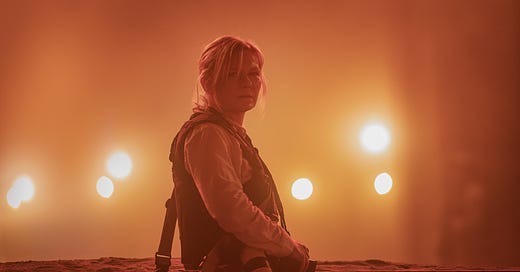'Civil War': Apocalypse Soon
Writer/director Alex Garland’s latest film warns us: don't do this.
Alex Garland, the British novelist turned screenwriter turned director, has become the poet laureate of plausible dystopian near-futures. His most famous work to date has centered around subjects such as epidemics (28 Days Later), environmental issues (Sunshine, Annihilation), artificial intelligence and the tech industry (Ex Machina, Devs), systemic misogyny (Men), systemic class oppression (Never Let Me Go), and almost all of the above (Dredd).
The harrowing and unshakeable Civil War, Garland’s fourth film working as both writer and director, continues this trend, positing an unsettlingly easy-to-imagine world in which the United States is, once again, engaged in battle with itself.
The year in which the story is set is never specified, although there’s nothing overtly futuristic about the film’s setting. At one point, however, a character refers to an event known as “The Antifa Massacre,” which occurred roughly twenty years before the events of this story, which leads me to believe that Civil War is set in an alternate reality just a step removed from our own.
The exact circumstances behind the conflict are only alluded to, often in throw-away dialogue like the line about Antifa and the portrayal of the President’s loyalists as jingoistic and violently anti-news media. The details are, in fact, beside the point: Civil War isn’t really about how or why a country turns on itself so much as it’s about the horrors that await the country once it does.
What we do learn for certain is this: the President (Nick Offerman), currently in his (presumably self-appointed) third term, has disbanded the FBI and used air strikes against American citizens, and the secession is led by the ‘Western Forces,’ overseen by California and Texas (the idea of California and Texas working together may be the most fantastical part of the movie; Garland says he made the decision “to get around a kind of reflexive, polarizing position that people might fall into,” and to imply that this President is so bad that enemies would put aside their differences to unite against him). As the film begins, the war has been going on for 14 months, and despite the President’s public proclamations of impending victory (using Trumpish verbiage: “Some are saying this is the greatest victory in military history!”), the Western Forces are rumored to be days away from storming Washington, D.C., and taking control of the White House.
Tellingly, Garland’s main characters in this story are not the political and military leaders of the conflict or the grunts fighting the war on the front lines: it’s a quartet of journalists, in a race to beat the Western Forces to the capital with the hopes of obtaining what will likely be the last-ever interview with the President. The group includes Lee (Kirsten Dunst), a weary veteran war photographer; Joel (Wagner Moura), an adrenaline-junkie wordsmith; Sammy (American goddamn treasure Stephen McKinley Henderson), a veteran reporter who refuses to retire despite his advancing age and declining health; and Jessie (Cailee Spaeny), an aspiring war photographer who idolizes Lee.
Focusing on people who wield pens and cameras instead of guns and grenades allows Garland to honor the men and women who risk their lives to document and disseminate history; it also provides him with the chance to interrogate the relationship between objectivity and human emotion, such as when Jessie asks Lee, “If I was shot, would you photograph it?” The conclusions about this relationship at which Garland arrives are surprising, even if some of Civil War’s plot beats are not (some characters are so obviously doomed from the moment we meet them, they may as well have the words “Cannon Fodder” stamped on their foreheads).
Civil War has an episodic structure reminiscent of Apocalypse Now: the characters encounter an array of increasingly perilous situations as they venture closer and closer to their target, deeper and deeper into the heart of darkness. There isn’t much connective tissue between these events; stopping to document fire-fights or avoid being shot by a sniper never seems to delay them much, or even force them to reconsider their route. But because the characters feel so real, and because the events portrayed in the film are so anxiety-inducing, it doesn’t really matter that our quartet is just going from place to place to place; we care about them, and more importantly, we believe the ways in which they change throughout the course of the story.
Garland’s talent has never been in doubt. But the problem I’ve sometimes had with his other films is that for all their technical sophistication, their narratives ultimately hinge on simplistic morality. With Civil War, Garland at last sidesteps this weakness: the group encounters a few characters who are inarguably evil, but they themselves, and even some of the horrors they witness, are far more morally complex. There’s a scene in the movie where Lee, recalling her past work before the events of this film, says, “Every time I survived a war zone, I thought I was sending a warning home: don’t do this.” That’s also Garland’s message to us. His concern is not with good guys and bad guys - it’s with unnecessary suffering and death.





